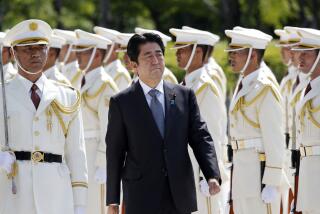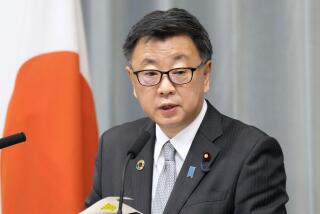Japan’s Emperor to Make a Historic Visit to China
- Share via
TOKYO — Ending an eight-month struggle to win approval from his own ruling Liberal Democratic Party, Prime Minister Kiichi Miyazawa told party leaders Monday that Emperor Akihito will make the first-ever imperial visit to China this fall.
An official announcement by both countries is expected to be made Aug. 25. Akihito and Empress Michiko will travel to Beijing, Shanghai and the ancient capital of Xian--probably between Oct. 22 and Oct. 27, Japanese officials said.
It will be the second official overseas trip for Akihito, 58, and Michiko, 57--both journeys to Asia and both to countries with spotty records on democracy.
Last fall, the imperial couple visited Thailand while a government established by a military coup was running the country, and they then went on to Indonesia and Malaysia.
No criticism arose in Japan over the timing of the visit to Thailand, but this time nationalistic ruling party members objected to China’s human rights violations, suppression of democracy and weaponry sales to Third World nations.
Also cited were a renewed Chinese claim to the Senkaku Islands (called the Diaoyutai Islands by the Chinese), fears that China would demand a humiliating apology for Japanese aggression and Beijing’s repeated condemnations of visits by Japanese leaders to Yasukuni Shrine, where Japan’s war dead--including war criminals, such as former Prime Minister Hideki Tojo--are enshrined.
Former Prime Minister Sosuke Uno specifically urged Miyazawa to visit the shrine to avoid creating an impression that Japan was bowing to objections from China by refraining from paying respects to its war dead.
Moderates within the ruling party added their voices to the chorus of opposition when Jiang Zemin, general secretary of the Chinese Communist Party, visiting Tokyo in April, expressed concern over Japan’s plan to send noncombat troops to Cambodia as U.N. peacekeepers--even though China sent noncombat troops to Cambodia.
“There were worries about the Senkaku Islands, (China’s opposition to) the U.N. peacekeeping organization law and the emperor’s statement (to be made in Beijing), but we have cleared up those issues,” Miyazawa assured party elders in a meeting last week.
Miyazawa said the trip would herald a new era in Japanese-Chinese relations and would signify the end of the “postwar period” between the two nations.
Akihito is expected to offer some kind of apology for Japan’s 1931 seizure of Manchuria and its 1937-45 war against China, but Beijing agreed that it would not make any demands concerning the phrasing of what Japanese call “the honorable words” to be spoken by the emperor, Chief Cabinet Secretary Koichi Kato said.
Miyazawa called Tamisuke Watanuki and three other top officials of the ruling party to his office Monday to inform them that he had decided to approve the trip. All four officials said the ruling party would support his decision.
The visit, to commemorate the 20th anniversary of the establishment of diplomatic relations between Tokyo and Beijing, was sought repeatedly by China, apparently in an effort to win an additional international stamp of respectability in the wake of the 1989 massacre in Tian An Men Square.
The imperial visit will serve to renew a Japanese sense of obligation to China for its gesture in refraining from demanding war reparations when diplomatic relations were restored in 1972, the analysts said. It also will serve as the ultimate official go-ahead signal to potential Japanese investors.
Times staff writer David Holley in Beijing contributed to this story.
More to Read
Sign up for Essential California
The most important California stories and recommendations in your inbox every morning.
You may occasionally receive promotional content from the Los Angeles Times.













